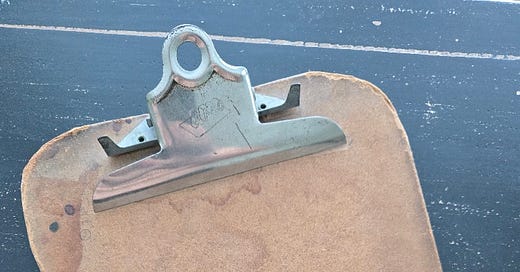Talisman
So much has changed over the years – easily visible in recordings of my clinical work spanning the last four decades. Clothing style, the cut and length of my hair, office décor and location, the names and faces of team members with whom I’ve worked.
One constant – from the late 1980’s to the present – has been my clipboard. I’m sure you know the type. Chocolate brown hardboard with a metal clip along the top edge. Mine is worn, the board ragged and stained, its once shiny clasp now a cloudy grey. In truth, it was beat up when I took it from a pile of clipboards, all resting haphazardly on a shelf directly below the one-way mirror of the observation room at the Brief Family Therapy Center in Milwaukee, Wisconsin.
At that point, it had not yet become my clipboard. That took time, several months, actually. During my first few weeks employed at the clinic, I used whichever one happened to be at the top of the pile. We all did. Seated together in the darkness, my colleagues and I would take notes about the session taking place on the other side of the mirror. We used the same clipboards in the consulting room, jotting down exact verbal utterances in the hope of better understanding the people coming to us for help – and then back on the pile they’d go.
For reasons that still escape me, I eventually began seeking out that particular clipboard, sorting through the stack rather than taking whichever one sat on top. Somewhere along the way, I stopped returning it, choosing instead to keep it in my office, by the telephone, ready for the next session or staff meeting.
The change did not go unnoticed.
“Here you go,” Larry said as he placed the clipboard on my desk, “We’ve got a pretty large group coming in, and I don’t want yours to go missing.” He was talking about the 40 or so therapists coming from around the world to attend an intensive training at the clinic. Held multiple times throughout the year, I loved these days. Live client interviews interspersed with mini-lectures and practice sessions beginning early and extending late into the night.
It was following one such event that my clipboard went missing. I’d just come back from Kitt’s, the frozen custard stand across the street from the clinic, chocolate shake in hand, sloppy joe and thick-cut fries in a grease-stained bag.
(I’d never heard of frozen custard prior to moving from the west coast to the Midwest. Neither was I a regular consumer of such unhealthy, but amazingly tasty fare. The aromas wafting into the office from across the street on Saturdays were too tempting to resist, a fantastic way to fight the sense of depletion that followed a “week-long”)
Knowing I had a couple of clients scheduled for the afternoon, I decided to retrieve the clipboard from my office before heading to the training room to eat.
It wasn’t there.
Setting my food down, I began searching. Brief, as we jointly referred to the office, wasn’t a giant space, so it didn’t take long.
It was nowhere to be found.
Neither had anyone seen or used it. Not Insoo. Not Steve. Not Larry. Not Jane. Not our office manager, Dolores.
I’m embarrassed to admit, beyond irritation and puzzlement, a sense of panic welled up in me. I had to consciously reassure myself that the clipboard would turn up and that I was perfectly capable of meeting my afternoon clients without it.
It didn’t.
And, no, it hadn’t inadvertently been tossed in the trash and was not in my car, apartment, or my then girlfriend’s house. I know because I looked.
A year or so later, I received a package in the mail. It had been forwarded to my new home in Chicago, my tenure at Brief having ended a few months prior. I’d received other correspondence since relocating, so, despite the absence of a return address, it wasn’t unusual or unexpected.
Inside was my clipboard. No note or letter, only an unsigned, yellow Post-it note stuck on the front, reading, “I believe this is yours.”




